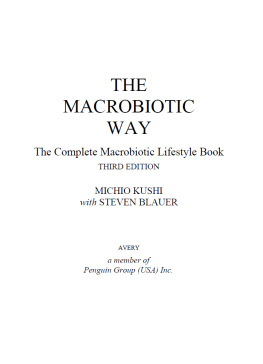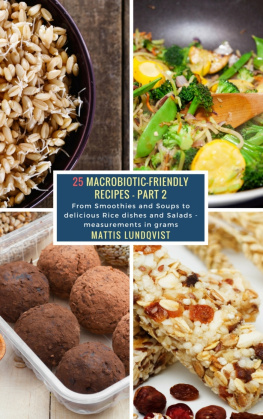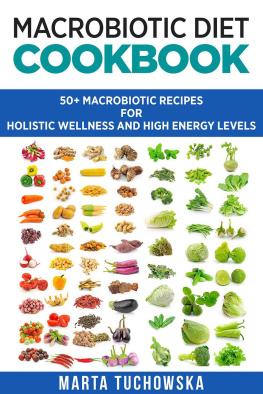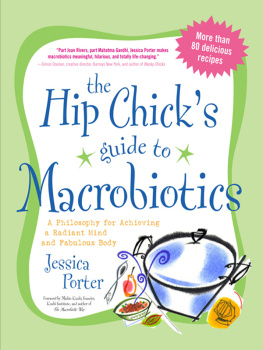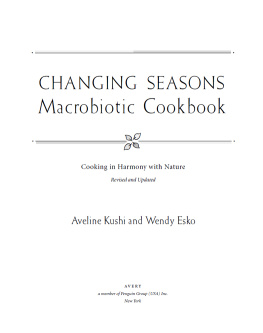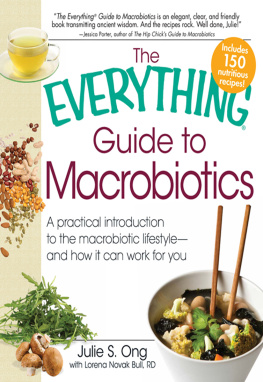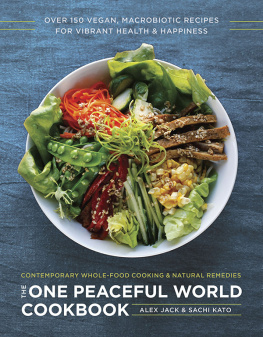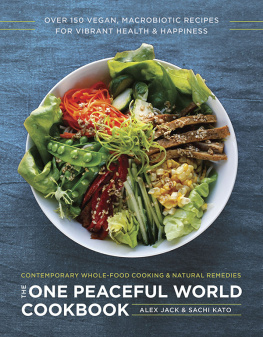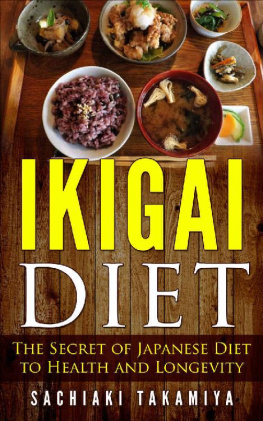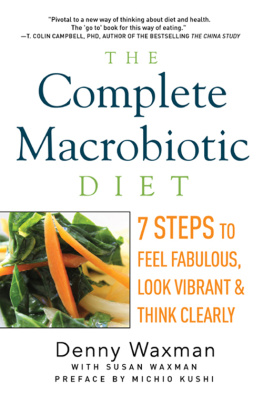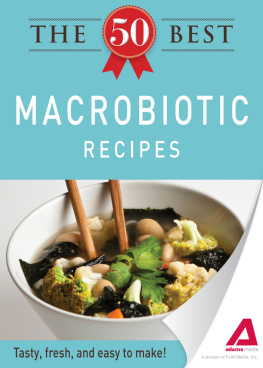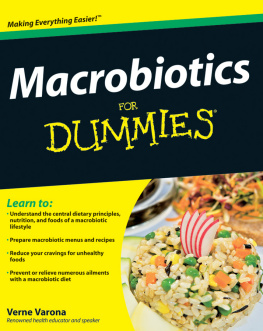THE
MACROBIOTIC
WAY
OTHER AVERY BOOKS
ABOUT MACROBIOTICS
American Macrobiotic Cuisine
M EREDITH M C C ARTY
Changing Seasons Macrobiotic Cookbook
A VELINE K USHI AND W ENDY E SKO
The Macrobiotic Approach to Cancer
M ICHIO K USHI WITH E DWARD E SKO
The Macrobiotic Cancer Prevention Cookbook
A VELINE K USHI WITH W ENDY E SKO
Macrobiotic Community Cookbook
A NDREA B LISS -L ERMAN
Making the Transition to a Macrobiotic Diet
C AROLYN H EIDENRY
THE
MACROBIOTIC
WAY
The Complete Macrobiotic Lifestyle Book
THIRD EDITION
MICHIO KUSHI
with STEVEN BLAUER

Neither the publisher nor the authors are engaged in rendering professional advice or services to the individual reader. The ideas, procedures, and suggestions contained in this book are not intended as a substitute for consulting with a physician. All matters regarding health require medical supervision. Neither the authors nor the publisher shall be liable or responsible for any loss, injury, or damage allegedly arising from any information or suggestion in this book. The opinions expressed in this book represent the personal views of the authors and not of the publisher.
The recipes in this book are to be followed exactly as written. Neither the publisher nor the authors are responsible for specific health or allergy needs that may require medical supervision, or for any adverse reactions to the recipes in this book.
While the authors have made every effort to provide accurate telephone numbers and Internet addresses at the time of publication, neither the publisher nor the authors assume any responsibility for errors or for changes that occur after publication.
Most Avery books are available at special quantity discounts for bulk purchase for sales promotions, premiums, fund-raising, and educational needs. Special books or book excerpts can be created to fit specific needs. For details, write Penguin Group (USA) Inc. Special Markets, 375 Hudson Street, New York, NY 10014.

a member of
Penguin Group (USA) Inc.
375 Hudson Street
New York, NY 10014
www.penguin.com
Copyright 1985, 1993, 2004 by Michio Kushi and Stephen Blauer
All rights reserved. This book, or parts thereof, may not be
reproduced in any form without permission.
Published simultaneously in Canada.
Library of Congress Cataloging-in-Publication Data
Kushi, Michio.
The macrobiotic way : the complete macrobiotic lifestyle book / Michio Kushi, with Stephen Blauer.3rd ed.
p. cm.
Previously published with subtitle: The complete macrobiotic diet & exercise book.
Includes bibliographical references and index.
ISBN: 978-1-101-66237-3
1. Macrobiotic diet. 2. Exercise. 3. Health. I. Blauer, Stephen. II. Title.
RM235.K873 2004 2003061756
613.264dc22
Version_1
I dedicate this work to the memories of
my wife and daughter, Aveline and Lily,
and to all my wonderful children.
Further, I thank George and Lima Ohsawa,
and the millions of people worldwide
who share our dream of world peace
and happiness for everyone.
Preface
The earliest recorded use of the term macrobiotics is found in the writings of Hippocrates, the father of Western Medicine. In his essay Airs, Waters, and Places, Hippocrates introduced the word to describe people who were healthy and long-lived. Translated from the Greek, macro means large or great, and bios signifies life. Herodotus, Aristotle, Galen, and other classical writers used the term macrobiotics to describe a lifestyle, including a simple balanced diet that promoted health and longevity.
In the late eighteenth century, the German physician and philosopher Christopher W. Hufeland renewed interest in the term. His influential book on diet and health was entitled Macrobiotics, or The Art of Prolonging Life.
Nearly a century later, the term macrobiotics experienced another revival, this time originating in Japan. Two educators, Sagen Ishizuka, M.D., and Yukikazu Sakurazawa, cured themselves of serious illnesses by adopting a simple diet of brown rice, miso soup, sea vegetables, and other traditional foods. They spent many years studying and integrating traditional Oriental medicine and Eastern philosophy with Judeo-Christian teachings and holistic perspectives in modern science and medicine. Sakurazawa went to Paris in the 1920s. Later, he adopted the name George Ohsawa and applied the term macrobiotics to his teachings.
From the time of his illness until his death at the age of seventy-four, Ohsawa devoted himself to defining macrobiotics as it applies to modern living. He did much to spread information about the macrobiotic lifestyle, visiting more than thirty countries, giving more than 7,000 lectures, and publishing more than three hundred books.
Ohsawa had many students, among them Michio Kushi, the author of this book. Kushi was born in 1926 and graduated from Tokyo University with a degree in international law before coming to the United States in 1949. While completing further studies at Columbia University in New York, he also began teaching the macrobiotic approach to diet and health as the areas to achieve world peace. Kushi enjoyed sharing his knowledge of macrobiotics and natural health with others so much that he made it his lifes work.
When Kushi began teaching macrobiotics, he met many people who were eager to learn, but were unaccustomed to eating simple whole foods. He saw that there was a need to adapt the macrobiotic diet to modern tastes while retaining its integrity. Over the years, Kushi has traveled extensively, lecturing and teaching the macrobiotic way to groups around the world.
Macrobiotics advocates the use of traditional foods such as whole grains, beans, and locally grown vegetables as the primary sources of food energy and nutrition. In addition, the diet includes nutritious soyfoods, which have been used in Asia for hundreds of years, and mineral-rich foods from the oceansea vegetables and certain types of fish. In the macrobiotic diet, moderate amounts of white-meat fish and shellfish are often substituted for the red meat and poultry that are common elements of the typical Western diet. Sea salt and natural grain sweeteners such as rice syrup and barley malt replace the refined salt and sugar that currently play a major role in modern fare.
When Michio Kushi first accepted the challenge of helping people shift to a more healthful way of eating and living, he had trouble finding many of the wholesome foods that he recommended. So, with his late wife, Aveline, he started a natural foods business to fill the need. Later to be called Erewhon Foods, this small enterprise developed into a $17 million business specializing in macrobiotic and natural foods. After acquiring the nearly 100-year-old U.S. Mills, the company adopted U.S. Mills as its name, and Erewhon remains as a brand name.
To research and popularize the macrobiotic approach, Michio and Aveline Kushi founded the East-West Foundation and the Kushi Institute (of which their son Phiya is now executive director), both nonprofit educational organizations; the

